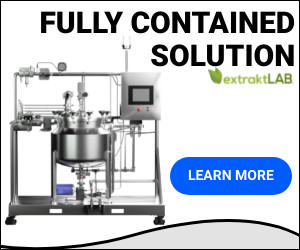If you start to read about what kind of distillation equipment to purchase, you will inevitably encounter many technical terms and jargon. All the interchanging terms can be confusing, even for an experienced practitioner. Here are some definitions so we can talk about the different types of equipment:
Evaporation refers to the thermal process of a liquid changing to a gas under a pressure or thermal influence. This change is also known as a “phase change”. This happens when water boils and makes water vapor. In the case of hemp processing, evaporation refers to two different processes. First, a phase change of cannabinoids like CBD from the liquid state evaporating to a gas at a high temperature and vacuum. This change happens at the evaporator surface. Second, evaporation refers to the phase change of a solvent such as ethanol as it is being removed from the oil. An evaporator typically has an external condenser
Distillation refers to the thermal process of evaporation and condensation that separates components of a mixture on the basis of different evaporation temperatures. Evaporation of a liquid will produce a gas. That gas then travels (called diffusion) to a condenser where it cools and condenses back to a liquid. This is typically accomplished under a vacuum pump.
Thin Film is important so efficient evaporation can occur. Wiped film apparatus used in hemp distillation are not usually fixed distance but typically use “comb” shaped wipers to mix the oil on the surface of the oil while simultaneously creating a thin film at the surface.
Molecular Distillation refers to distillation under high vacuum pressure that reduces the probability or frequency of one evaporated molecule encountering another. Under high vacuum, evaporation of cannabinoids from oil purportedly migrate unimpeded from the evaporator to the condenser. However, the conditions for true molecular distillation do not occur in the case of hemp oils as there are always other compounds that co-distill with the cannabinoids
Wiped Film refers to the existence of a wiper to wipe a fluid over a hot evaporation surface. Wiped film evaporation refers to evaporation from the hot surface as the wiper creates a thin film on the evaporation surface
Short Path refers to the distance that the evaporated liquid vapor travels from the evaporation surface to reach the condenser. In practice, “short path” describes the location of the condenser in relation to the evaporator. Short path has an internal condenser (clearSTILL 400) whereas an evaporator has an external condenser (fracTron 1000).
Falling Film refers to a film that spreads over an evaporative surface by gravity. The fluid in this case must have low viscosity at the evaporator temperature so that it can flow and evaporate.
Still refers to an apparatus where distillation (evaporation and condensation) are taking place independent of whether the still is short path, falling film, molecular, or wiped film.
Fractional Distillation refers to the ability to start distilling at a low temperature and ramp up the temperature to sequentially boil the components. The components are also sequentially condensed thus allowing separate fractions to be collected.
Now that these terms are defined, you can put them together:
| Condenser | Typical Pressure or Vacuum Level | Mixing | Boiling point for target liquid | |
|---|---|---|---|---|
| Wiped Film Evaporator (WFE) | External | Pressurized to 0.1 torr | Film wiped on evaporator | Low boiling solvents |
| Falling Film Evaporator | External | Pressurized to 0.1 torr | No wiper | Low boiling solvents |
| Wiped Film Distillation | Internal, short path | Molecular <0.001 torr | Film wiped on evaporator | High |
| Fractional Distillation AKA “Short Path” Distillation Apparatus | External | 0.1 torr | No wiper | High |
| Thin Film Evaporator | External | Pressurized to 0.1 torr | No wiper | Low boiling solvents w/low viscosity |


